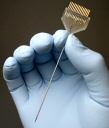 Neurophilosophy has a great write-up of the recent finding that deep brain stimulation boosted memory function in a patient undergoing brain surgery to treat morbid obesity.
Neurophilosophy has a great write-up of the recent finding that deep brain stimulation boosted memory function in a patient undergoing brain surgery to treat morbid obesity.
I’ve only just got round to having a look at the scientific paper myself, and the summary on Neurophilosophy captures the main themes beautifully, and is some of the best coverage I’ve read so far.
A couple of things stand out for me.
Firstly, the patient was given a last-ditch experimental treatment for obesity by having an electrode planted in the ventral hypothalamus, a deep brain structure, to try and reduce his appetite.
The hypothalamus is involved in regulating a number of essential bodily functions and most pertinently, contains glucoreceptors – cells that detect levels of glucose in the body to regulate feeding and appetite.
A lot has been written about the role of ‘mechanical’ models of the mind and brain in undermining our sense of free will and responsibility for our actions.
This case suggests that we’ve now got to the stage where an inability to control a biological urge which negatively affects few people except the patient himself, is reason enough to consider neurosurgery.
I wonder whether deep brain stimulation for people who can’t give up cigarettes, alcohol or self-harm will be next.
Secondly, the immediate effect of the stimulation on the patient, who was flooded with numerous vivid memories, is quite striking:
Unexpectedly, the patient reported sudden sensations that he described as déjà vu with stimulation of the first contact tested (contact 4: 3.0 volts, 60-microsecond pulse width [pw], and 130Hz). He reported the sudden perception of being in a park with friends, a familiar scene to him. He felt he was younger, around 20 years old. He recognized his epoch-appropriate girlfriend among the people. He did not see himself in the scene, but instead was an observer. The scene was in color; people were wearing identifiable clothes and were talking, but he could not decipher what they were saying. As the stimulation intensity was increased from 3.0 to 5.0 volts, he reported that the details in the scene became more vivid.
This is a strikingly similar experience to the memories triggered by electrical stimulation of the surface of the temporal lobe reported by legendary Canadian neurosurgeon Wilder Penfield in the 50s and 60s:
The other response is an activation of the stream of past experience. This is what the patient often refers to as a ‘flash-back’ to his own past. When the electrode is applied, he may exclaim in surprise, as the young secretary, M M, did: ‘Oh, I had a very, very familiar memory, in an office somewhere. I could see the desks. I was there and someone was calling to me, a man leaning on a desk with a pencil in his hand.’ Or the patient may call out in astonishment, as J T did (when the current was switched on without his knowledge): ‘Yes, Doctor, yes, Doctor! Now I hear people laughing – my friends in South Africa … Yes, they are my two cousins, Bessie and Ann Wheliaw.’
However, despite testing over 600 patients in this way, less than 8% had the experience of electrically triggered memories, and the effect has not been reliably replicated by modern researchers.
This suggests that the flood of memories triggered by stimulating the hypothalamus in this new study, perhaps may not happen in all people.
Of course the big finding in this new study was not the triggered memories, but that when the stimulation was switched on for longer periods, the patient did much better in memory tests.
It will be interesting to see whether this general effect on memory is perhaps as unpredictable across individuals as electrically evoked memories have proved to be in the past.
Link to Neurophilosophy post on the new study.
Link to abstract of scientific paper.
Link to Penfield’s paper (with evoked memory memory examples).